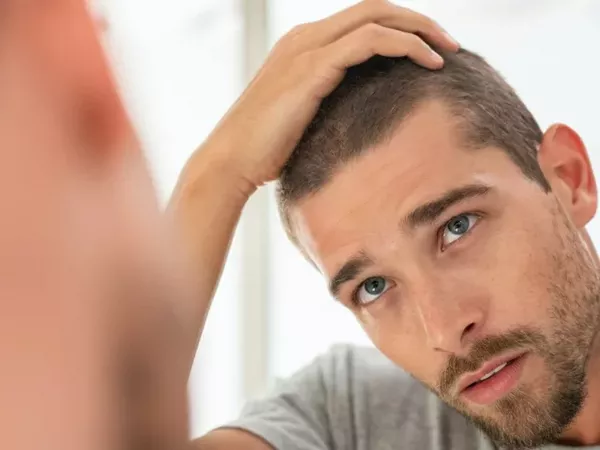Hair loss is a common concern that affects millions of people worldwide. While various factors can contribute to hair loss, one that often goes unnoticed is anemia. Anemia is a condition characterized by a deficiency of red blood cells or hemoglobin, leading to a lack of oxygen supply to tissues. In this article, we will explore the connection between anemia and hair loss, shedding light on why this often-overlooked condition may be the root cause of your thinning locks.
I. Understanding Anemia:
A Brief Overview Anemia refers to a reduced capacity of the blood to carry oxygen due to a low red blood cell count or inadequate hemoglobin levels. It can be caused by multiple factors, such as iron deficiency, vitamin B12 deficiency, chronic diseases, or genetic conditions. Anemia affects the body’s ability to deliver oxygen to the organs, including the hair follicles.
II. Anemia and Hair Growth: The Intricate Connection
The Impact on Hair Follicles:
Hair follicles require a consistent supply of oxygen and nutrients to maintain healthy growth. When anemia diminishes oxygen delivery to these follicles, their activity is compromised, leading to weakened hair strands and eventual hair loss.
Telogen Effluvium:
Anemia can trigger a condition called telogen effluvium, which disrupts the normal hair growth cycle. Telogen effluvium causes a significant number of hair follicles to prematurely enter the resting phase (telogen) and eventually shed. This leads to increased hair shedding and noticeable thinning.
Iron Deficiency Anemia and Ferritin Levels:
Iron deficiency anemia is one of the most common types of anemia. Iron is essential for hair growth, as it aids in the production of red blood cells and helps carry oxygen. Low iron levels can contribute to hair loss by affecting the hair follicles’ ability to receive adequate oxygen and nutrients. Monitoring ferritin levels, a protein that stores iron, is crucial in identifying potential iron deficiencies that may lead to hair loss.
III. Recognizing the Signs and Symptoms
Excessive Hair Shedding:
One of the early signs of anemia-related hair loss is excessive shedding. You may notice an increased number of hairs in your brush or on your pillow, especially during periods of stress or after significant hormonal changes.
Thinning Hair and Brittle Strands:
Anemia-related hair loss typically manifests as generalized thinning rather than bald patches. Hair may become weak, brittle, and prone to breakage, often leaving you with an overall diminished hair volume and texture.
Changes in Hair Color and Texture:
In some cases, anemia can affect the melanin production responsible for hair pigmentation, leading to changes in color or texture. Hair may appear dull, lifeless, and lack its usual shine.
IV. Seeking Diagnosis and Treatment
Consulting a Healthcare Professional:
If you suspect anemia as a potential cause of your hair loss, it is vital to consult with a healthcare professional. They can evaluate your symptoms, conduct blood tests, and identify the underlying cause of anemia to provide appropriate treatment recommendations.
Treating Anemia:
Treatment options for anemia vary depending on the underlying cause. In cases of iron deficiency anemia, supplements or dietary changes rich in iron, such as leafy greens and lean meats, may be prescribed. For other forms of anemia, treating the underlying condition or addressing deficiencies in vitamins like B12 or folate may be necessary.
Lifestyle Modifications:
In addition to medical treatment, certain lifestyle modifications can help support healthy hair growth. A balanced diet rich in iron, protein, and essential vitamins and minerals is crucial. Additionally, managing stress levels, getting regular exercise, and ensuring adequate sleep can all contribute to overall hair health.
V. Preventing Anemia-Related Hair Loss
Maintain a Nutrient-Rich Diet:
Eating a well-balanced diet is essential for preventing anemia-related hair loss. Incorporate foods that are rich in iron, such as spinach, lentils, red meat, and fortified cereals. Additionally, include sources of vitamin C, which aids in iron absorption.
Supplements and Vitamins:
In consultation with a healthcare professional, consider taking supplements or multivitamins that contain iron, vitamin B12, and other essential nutrients that support healthy hair growth. However, it’s important to note that supplements should only be taken under medical guidance to avoid potential side effects or interactions with other medications.
Avoid Excessive Styling and Heat:
Over-styling, excessive use of heat tools, and harsh chemical treatments can weaken hair strands and exacerbate hair loss. Minimize the use of hot styling tools and opt for gentle, natural hair care products to protect your hair from damage.
Manage Stress Levels:
Chronic stress can disrupt the body’s normal functioning, including hair growth. Engage in stress-reducing activities such as meditation, yoga, or hobbies to promote overall well-being and support healthy hair growth.
VI. When to Seek Further Evaluation
While anemia is a common cause of hair loss, it is crucial to consider other potential factors. If your hair loss persists or worsens despite addressing anemia or if you experience additional concerning symptoms, it’s important to consult with a healthcare professional for a comprehensive evaluation.
Conclusion:
Anemia and hair loss share an intricate connection that often goes unnoticed. The impact of anemia on oxygen supply and nutrient delivery to the hair follicles can lead to weakened strands, excessive shedding, and overall thinning of the hair. Recognizing the signs and symptoms, seeking a proper diagnosis, and receiving appropriate treatment for anemia are crucial steps in addressing hair loss caused by this condition. Additionally, adopting a nutrient-rich diet, incorporating supplements under medical guidance, and practicing healthy hair care habits can help prevent anemia-related hair loss and promote overall hair health. By understanding the hidden link between anemia and hair loss, you can take proactive steps to restore and maintain a luscious, vibrant mane.

